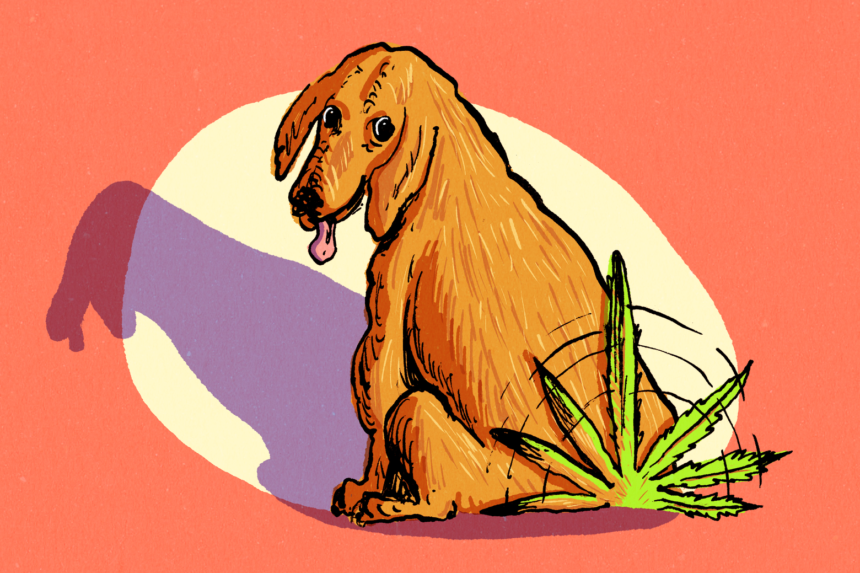Scott Maguire thrusts his phone toward his webcam, showing me his phone background. “I don’t have my kids. I don’t have my wife,” he says. “I’ve got my dog.”
Bozy, a Cavalier King Charles spaniel, almost didn’t make it a year. In 2018, the dog was diagnosed with cancer while he was still a 9-month-old pup. Maguire says Bozy inspired him to delay retirement and start U.K.-based medical cannabis company Wellford Medical because he claims weed saved Bozy’s life.
If this origin story sounds a little too perfect, I hear you. I thought so too. But when I began looking into medical cannabis for dogs, Bozy’s story started to sound quite plausible. According to Maguire, Bozy’s vet said that treatment with chemotherapy or steroids would immediately kill him, as he was so weak from lack of appetite. The vet said Bozy needed to be put down or he’d die of starvation.
Courtesy of Scott Maguire
Maguire, who has founded multiple health care companies, knew that cannabis can help cancer patients eat. So, as a Hail Mary, Maguire went and bought some weed from a local ski instructor near his home in Switzerland. He exhaled the smoke into his hands as he cupped them around the dog’s snout. Suddenly, Bozy could eat a little, according to Maguire. Eventually he was able to get Bozy healthy enough for treatment by “administering” cannabis dozens of times a day.
And don’t worry: Bozy is still alive now, six years later.
I was surprised to learn Maguire gave Bozy street weed that contained THC, the psychoactive component of cannabis. If you have a canine, you’ve probably heard of CBD for dogs. CBD is the second-largest compound of the cannabis plant, is considered nonpsychoactive, and is marketed as an herbal supplement for anxiety, pain, and insomnia. CBD products became widely available for dogs and people in 2018, when the Farm Bill legalized cannabis products that contained less than 0.3 percent delta-9 THC. Since then, the message we get is that CBD is fine for dogs, but THC is a terrible idea.

Every time a dog gets into someone’s weed chocolate bar, this message is reinforced. But when a dog accidentally is intoxicated with cannabis edibles, they probably ate an amount that could make a human vomit. Trina Hazzah, president and co-founder of the Veterinary Cannabis Society, told me that many edibles contain other ingredients that are dangerous for dogs, like chocolate and xylitol. In her own practice, including as an adviser for the Los Angeles Zoo, Hazzah has found that careful, conscientious dosing of cannabinoids including THC can be life-changing for animals.
Hazzah began her career as a veterinary oncologist, treating cancer in pets with conventional methods like chemotherapy, radiation, and immunotherapy. “I realized that I just wasn’t doing enough for my patients,” she says. She began studying herbal medicine, which led her to cannabis.
Her first cannabis patient was a Jack Russell terrier with a squamous cell carcinoma, a type of skin cancer that causes tumors. His owners wanted to treat him with cannabis, and so she researched what products might work best, and they gave it a try.
“Two weeks later, they wrote me and said, ‘Hey, I think [the tumors are] getting better.’ And I was like, ‘No way.’ ” In fact, the dog’s tumors were actually shrinking. Hazzah founded Green Nile in 2019 to provide medical cannabis guidance to pet owners and has continued to see that for a small portion of her cancer patients—she estimates around 15 to 20 percent—cannabis helps either reduce or maintain the size of tumors.
I should be clear: Without clinical testing, it’s impossible to know for sure whether it was the cannabis that caused the tumors to shrink. But multiple studies actually have shown that cannabis can significantly shrink cancer tumors in mice, according to a 2020 review paper published in the International Journal of Molecular Sciences. Whether or not it can do so in dogs and humans is still yet to be researched. On the other hand, it is well established that cannabis can help with cancer symptoms, like nausea and anorexia, in humans.
Hazzah herself doesn’t recommend cannabis alone to treat cancer, because it’s just not as effective as more traditional medical methods, but says it can be useful in combination with other treatments, like chemo.
The science is still unclear on the impact of THC on dogs. Most research on medical cannabis for dogs focuses on CBD, likely because it is much easier to legally study. But there are a few recent studies that look at THC. A 2024 case study published in Veterinary Pharmacology and Toxicology found that a combination of CBD and THC improved one dog’s lupus symptoms. A few small, recent studies have also looked at whether dogs could safely consume THC and found that they can in very small doses. In one study published in the same journal, negative side effects included increased sensitivity to noise but not actual intoxication.
Hazzah says that she’s seen THC cause paranoia in dogs. What does paranoia look like in dogs? “Fly biting,” says Hazzah, or biting at imaginary bugs in the air.
Hazzah says it’s very important to be cautious with the products you buy for your dog. She can’t legally prescribe cannabis products—instead she gives pet owners recommendations for what to look for. For one, it’s important to look for a detailed and recent certificate of analysis. COAs are formal certifications issued by third-party labs that look at the potency and contents of specific batches of cannabis products, including whether they contain toxins, like heavy metals. Not all cannabis products include COAs, and Hazzah recommends avoiding those that don’t.
“If a company isn’t going to be open about what’s inside their product, contaminant-wise and potency-wise, then to me, it doesn’t make sense,” she explained. “Why use something you don’t know what it is.”
I had to know if she thinks it’s OK to give a healthy dog a little weed just for a good time. But, Hazzah says, there’s no reason to recommend that. She uses cannabis to treat depression and anxiety in pets, but she says if your dog is happy and healthy, there is no reason to introduce something that could potentially have negative effects. It’s too bad, because from what I’ve found, there is no reliable catnip equivalent for dogs, although you can give anise a try.
As restrictions on cannabis continue to fall away around the globe, medical research will continue to reveal what the plant can really do. And maybe more dogs like Bozy will have a fighting chance at a long and healthy life.











